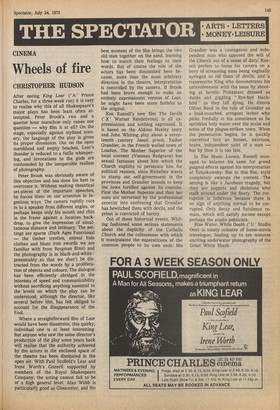Wheels of fire
CHRISTOPHER HUDSON
After seeing King Lear ('A ' Prince Charles, for a three-week run) it is easy to realise why this of all Shakespeare's major plays has been least often attempted. Peter Brook's two and a quarter hour marathon only raises one question — why film it at all? On the stage, especially against stylized scenery, the language of the play is given its proper dimension. Out on the open marshland and empty beaches, Lear's thunder is reduced to a futile whimpering, and invocations to the gods are confounded by the insuperable realism of photography.
Peter Brook was obviously aware of this objection and has done his best to overcome it. Without making theatrical set-pieces of the important speeches, he forces them on our attention in ingenious ways. The camera rapidly cuts in to a speaker from different angles, or perhaps keeps only his mouth and chin in the frame against a location backdrop, to give the impression of simultaneous distance and intimacy. The settings are sparse (Dark Ages Functional — the timber trestles, animal hide clothes and blunt iron swords we are familiar with from Bergman films) and the photography is in black-and-white : presumably so that we shan't be distracted from the words by a proliferation of objects and colours. The dialogue has been efficiently abridged in the interests of speed and communicability without sacrificing anything essential to the levels on which the play can be understood; although the director, like several before him, has felt obliged to account for the disappearance of the Fool.
Where a straightforward film of Lear would have been disastrous, this quirky, individual one is at least interesting. But anyone who saw the same director's production of the play some years back will realise that the authority achieved by the actors in the enclosed space of the theatre has been dissipated in the open air. With Paul Scofield's Lear and Irene Worth's Goneril supported by members of the Royal Shakespeare Company, the acting cannot fail to be of a high general level. Alan Webb is particularly good as Gloucester, and the best moment of the film brings the two old men together on the sand, learning how to match their feelings to their words. But of course the role of the actors has been diminished here because, more than the most arbitrary direction in the theatre, interpretation is controlled by the camera. If Brook had been brave enough to make an entirely expressionist version of Lear, he might have been more faithful to the original.
Ken Russell's new film The Devils (` X ' Warner Rendezvous) is all expressionism and nothing expressed. It is based on the Aldous Huxley story and John Whiting play about a seventeenth century Jesuit priest, Father Grandier, in the French walled town of Loudun. The Mother Superior of the local convent (Vanessa Redgrave) has sexual fantasies about him which the Church exploits to persecute him for political reasons, since Richelieu wants to stamp out self-government in the provinces and Grandier intends to keep the town fortified against its enemies. First the Mother Superior and then her nuns are terrorised by the professional exorcist into confessing that Grandier has bewitched them with devils, and the priest is convicted of heresy.
Out of these historical events, Whiting fashioned some serious statements about the duplicity of the Catholic Church and the callousness with which it manipulated the superstitions of the common people to its own ends. His Grandier was a courageous and independent man who opposed the will of the Church out of a sense of duty. Russell prefers to focus his camera on a bevy of screaming nuns being vaginally syringed to rid them of devils, and a transvestite King who demonstrates his uninvolvement with the issue by shooting at heretic Protestant dressed as ducks and giggling "Bye-bye blackbird " as they fall dying. He directs Oliver Reed in the role of Grandier as a loud-mouthed, arrogant lecher who picks fretfully at his conscience as he sprinkles holy water over the scabs and sores of the plague-striken town. When the persecution begins, he is quickly converted into an honest, uxorious, brave, independent saint of a man — but by then it is too late.
In The Music Lovers, Russell managed to balance his taste for grand guignol effects against his interpretation of Tchaikowsky. But in this film, style completely swamps the content. The setting is like a Jacobean tragedy, but they are puppets and skeletons who stalk around under the finery. The corruption is ludicrous because there is no sign of anything normal to be corrupted. Only decay and flatulence remain, which will satisfy no-one except perhaps the studio publicists.
Blue Water, White Death (' U ' Studio One) is ninety minutes of home-movie travelogue, leading up to ten minutes exciting underwater photography of the Great White Shark.










































 Previous page
Previous page